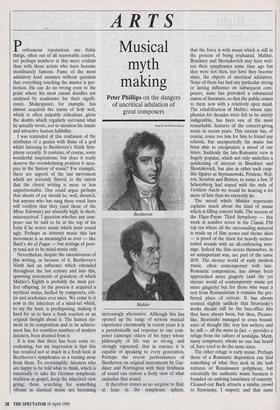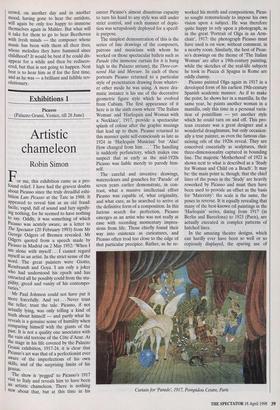ARTS
Musical myth making
Peter Phillips on the dangers of uncritical adulation of great composers
Posthumous reputations are fickle things, often out of all reasonable control, yet perhaps nowhere is this more evident than with those artists who have become inordinately famous. Fame of the most adulatory kind assumes without question that everything touching the master is per- fection. He can do no wrong even to the point where his most casual doodles are analysed by academics for their signifi- cance. Shakespeare, for example, has almost acquired the status of holy writ, which is often palpably ridiculous, given the doubts which regularly surround what he actually wrote, not to mention his innate and attractive human fallibility.
I was reminded of this confusion of the attributes of a genius with those of a god whilst listening to Beethoven's Ninth Sym- phony recently. It contains, of course, some wonderful inspirations, but does it really deserve the overwhelming position it occu- pies in the history of music? For example, there are aspects of the last movement which are seriously flawed, to the extent that the choral writing is more or less unperformable. One could argue perhaps that shouts of joy should be, well, shouted, but anyone who has sung these vocal lines will confirm that they (and those of the Missa Solemnis) are absurdly high; in short, misconceived. I question whether any com- poser can be said to be at the top of his form if he writes music which must sound ugly. Perhaps as abstract music this last movement is as meaningful as ever — like Bach's Art of Fugue — but settings of poet- ry tend not to be mind-music only.
Nevertheless, despite the excessiveness of this writing, or because of it, Beethoven's Ninth had an influence which extended throughout the last century and into this, spawning statements of grandeur, of which Mahler's Eighth is probably the most per- fect offspring. In the process it acquired a mythical status, fuelled by composers, crit- ics and academics ever since. We come to it now as the inheritors of a mind-set which, to say the least, is predisposing, making it hard for us to have a fresh reaction or an original thought about it. The human ele- ment in its composition and in its achieve- ment has, for countless numbers of modern listeners, been drained from it.
It is true that there has been some re- evaluating, but my impression is that this has resulted not so much in a fresh look at Beethoven's symphonies as a turning away from them. To oversimplify: listeners who are happy to be told what to think, which is essentially to take the German symphonic tradition as gospel, keep the inherited view going; those searching for something vibrant in classical music are becoming increasingly alternative. Although this has opened up the range of serious musical experience enormously in recent years it is a paradoxically sad response to one com- poser (amongst others of his type) whose philosophy of life was so strong, and strongly expressed, that in essence it is capable of speaking to every generation. Perhaps the recent performances of Beethoven on original instruments by Gar- diner and Norrington with their freshness of sound can restore a lively view of what underlies that sound.
It therefore comes as no surprise to find, at least in the symphonic sphere, Mahler that the force is with music which is still in the process of being evaluated. Mahler, Bruckner and Shostakovich may have writ- ten their symphonies some time ago but they were not then, nor have they become since, the objects of uncritical adulation. None of them has had any particular strong or lasting influence on subsequent com- posers, none has provoked a substantial canon of literature, so that the public comes to them now with a relatively open mind. The rehabilitation of Mahler, whose sym- phonies for decades were felt to be utterly indigestible, has been one of the most remarkable features of the concert-giving scene in recent years. This success has, of course, come too late for him to found any schools, but unexpectedly his music has been able to encapsulate a mood of our times. Suddenly the late-Romantic view is hugely popular, which not only underlies a quickening of interest in Bruckner and Shostakovich, but also in other such cusp- like figures as Szymanowski, Poulenc, Wal- ton, Scriabin and Britten, to name a few. If Schoenberg had stayed with the style of Verklarte Nacht we would be hearing a lot more of him than we currently do.
The mood which Mahler represents explains much about the kind of music which is filling concert halls. The success of the Elgar-Payne Third Symphony — this week at number seven in the Classic FM top ten where all the surrounding material is made up of film scores and theme discs — is proof of the thirst for heavily orches- trated sounds with an all-embracing mes- sage. Indeed the film scores themselves, in an unimportant way, are part of the same drift. The sterner world of early modern music, often contemporary with late- Romantic composition, has always been approached more gingerly (and the yet sterner world of contemporary music yet more gingerly) but for those who want a rest from Romanticism it remains the pre- ferred place of retreat. It has always seemed slightly unlikely that Stravinsky's works should still be the box-office hits they have always been, but then, Picasso- like, Stravinsky managed to cross bound- aries of thought like very few writers; and he still — all the more in fact — provides a refuge from the culture of nostalgia. Many, many composers, whom no one has heard of, have tried to do the same since.
The other refuge is early music. Perhaps those of a Romantic disposition can find something of what they seek in the lush textures of Renaissance polyphony, but essentially the authentic music business is founded on undoing luxuriance of sonority. Cleaned-out Bach attracts a similar crowd to Stravinsky, I suspect; and that same crowd, on another day and in another mood, having gone to hear the antidote, will again be only too happy to immerse themselves again in Mahler. But what will it take for them to go to hear Beethoven with fresh minds — the composer whose music has been with them all their lives, whose melodies they have hummed since childhood? It would be best if he could dis- appear for a while and then be rediscov- ered, but that is not going to happen. Next best is to hear him as if for the first time, and as he was — a brilliant and fallible rev- olutionary.



























































 Previous page
Previous page